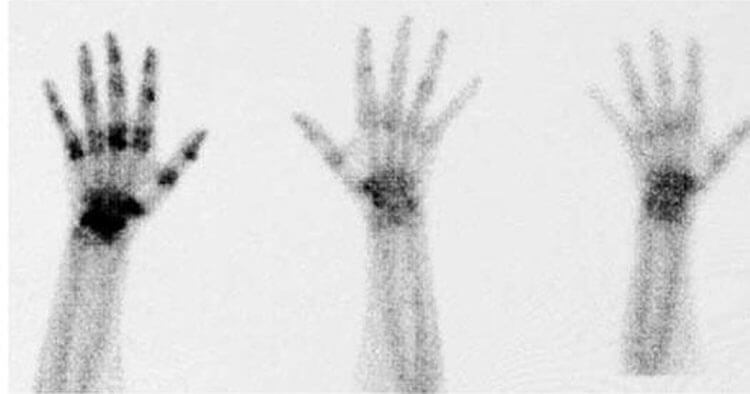Sports Injuries and Management
Physiotherapy And Healthcare Imaging
Healthcare Imaging By Bone Scan
A bone scan is an diagnostic test which uses a very small amount of radioactive dye to help reveal problems with bone metabolism (the process where by bones break down and rebuild themselves). Your body creating new bone formation is part of the healing process for when bones are broken or injured and a healthcare imaging investigation such as a bone scan is a good way to assess for any abnormal metabolic activity in the bones.
How Bone Scanning Works
With a bone scan a radioactive dye is injected. Results of the scan are considered normal when dye is spread evenly throughout the body. Results however are considered abnormal when the scan shows “hot spots” a darker area where an excess of dye has collected or “cold spots” a lighter area where the dye didn’t collect at all in the bones. Any abnormal results can indicate a bone disorder. It is worth noting that a bone scan is very sensitive in picking up a bone disorder but not overly specific in identifying what the actual disorder is. Correlated with clinical examination or other healthcare imaging tests a bone scan can be very useful.
Used in physiotherapy bone scans are a very sensitive way of revealing bone problems such as:
- Arthritis.
- Avascular necrosis (a condition where bone tissue dies due to lack of blood supply).
- Fractures (useful in helping diagnose stress fractures).
- Infection involving the bone.
Risks Verses Benefits Of Healthcare Imaging By Bone Scan
Seeing as a radioactive dye is injected with a bone scan there is exposure to a very small amount of radiation (however nearly all of the dye is released from your body within 2-3 days after injected). As a result of this radiation exposure a bone scan may be considered unsafe for pregnant or breast-feeding women.
There is also a low risk of allergic reaction to the dye however bone scans are generally considered a similar risk as having a plain X-ray.
Getting Referred For A Bone Scan By Your Physiotherapist
Please note a Sydney physio can not be bulk billed through Medicare for bone scans to any part of the body.
Healthcare Imaging By DEXA Scan
Bone Densitometry examines the health of your bones by measuring the mineral content of bone. Bone Densitometry can detect osteoporosis in its earliest stages and the potential risk for bone fractures. Dual Energy XRAY Absorptiometry known as DEXA for short is a bone density scan. A DEXA scan is a form of X-ray technology that is used to measure bone loss / bone mineral density.
How DEXA Scanning Works
A DEXA scan is a safe form of healthcare imaging and takes around 15-30 minutes. The radiation dose used is very low. During the test you are lying down and a scanner will pass over areas of your body measuring the density of bony areas of your body such as your spine, hips, wrists…
DEXA is most commonly used to diagnose osteoporosis, a condition where bones become thinner, more fragile and more likely to fracture as a result of the gradual loss of calcium and structural changes.
More recently DEXA scanning has been used to asses an individuals body composition and can accurately measure body fat percentage and muscle mass. Useful in assessing excessive abdominal fat, the presence of which is related to high risk for a number of health disorders. With the use of subsequent reassessment body composition scans are useful in assessing the impact of an individuals dietary and exercise changes by accurately measuring the loss of fat and any gains in muscle mass.
Risks Verses Benefits Of Healthcare Imaging By DEXA Scan
Generally it is considered with a DEXA scan the benefits of an accurate diagnosis outweigh any risks associated with having the test. In the diagnosis of osteoporosis a DEXA bone density testing is the most accurate method available and is subsequently considered to be an accurate estimator of fracture risk. It is a simple, noninvasive procedure and the amount of radiation used is extremely small (less than 1/10th the dose of that of a standard chest x-ray). However as always because there is some radiation exposure during the scan caution is taken with pregnant women.
Getting Referred For A DEXA Scan By Your Physiotherapist
Please note a Sydney physio can not be bulk billed through Medicare for DEXA Scans.
Disclaimer: Sydney Physio Clinic provides this information as an educational service and is not intended to serve as medical advice. Anyone seeking specific advice or assistance on Physiotherapy And Healthcare Imaging should consult his or her general practitioner, physiotherapist, sports medicine specialist, orthopedic surgeon or otherwise appropriately skilled practitioner.


